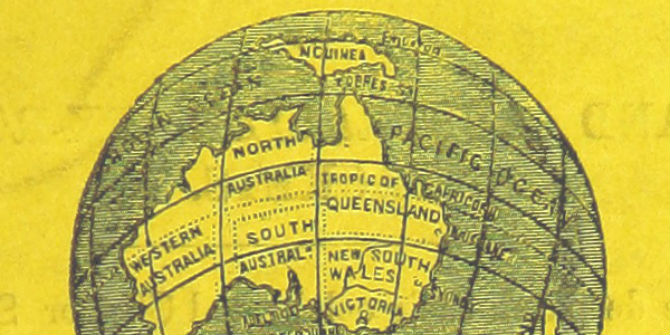
 Talk of ‘Global Britain’ has revived CANZUK – a proposed alliance of Canada, Australia, New Zealand and the UK, sharing some of the principles of the EU. Duncan Bell (University of Cambridge, left) and Srdjan Vucetic (University of Ottawa) discuss the history of the idea and argue that it is impossible to isolate it from its colonial origins.
Talk of ‘Global Britain’ has revived CANZUK – a proposed alliance of Canada, Australia, New Zealand and the UK, sharing some of the principles of the EU. Duncan Bell (University of Cambridge, left) and Srdjan Vucetic (University of Ottawa) discuss the history of the idea and argue that it is impossible to isolate it from its colonial origins.
It was coined in the 1950s, but the term CANZUK – a union (or alliance or pact) of Canada, Australia, New Zealand, and the United Kingdom – has been repurposed in the wake of the Brexit vote. Rallying behind it is a small but well-connected network of pro-Brexit politicians, policy-makers, journalists, and business leaders, who argue that since these countries already have so much in common, a globe-spanning zone of free movement of goods, services, and labour is a viable proposition. Some of them argue that further integration, with a new defence pact and even a transcontinental (con)federal polity, is both feasible and desirable.

This CANZUK argument deserves our attention. Together with developments such as the US retreat into unilateralism and the rise of the nativist right, the UK’s withdrawal from the EU is spawning new political possibilities and reconfiguring our geopolitical imaginaries. Yet, rather than “something completely new,” as its advocates argue, CANZUK is in fact remarkably old. Its conceptual roots, and many of its animating concerns and ideas, emerged during the imperial debates of the late 19th and early 20th century. Its revival reveals much about the character of policy thinking among conservatives within the so-called English-speaking world today.
A new union?
CANZUK supporters have already developed a loose transnational advocacy network, establishing grassroots campaigning organisations, publishing policy documents, creating social media platforms, and recruiting prominent intellectual entrepreneurs to proselytise the idea. American entrepreneur James Bennett was the first to (re)deploy the term. In a USA Today op-ed published hours after the Brexit vote in 2016, he called CANZUK “the kind of partner America had always hoped the EU would be but which never showed up in reality.” In the UK, two Brexiteers made the same argument around the same time: Andrew Lilico, a Tory think-tanker and economist, who served as an advisor to the Leave campaign, and the historian and journalist Andrew Roberts, who has touted “a CANZUK Union” as “one of the global great powers” and a “pillar of Western civilisation”. The idea has since piqued interest among several politicians and think tankers, including Conservative MEP Daniel Hannan (a well-known Brexit campaigner) and Tim Hewish, who in 2015 oversaw the merger of his conservative Eurosceptic outfit Commonwealth Exchange with the venerable Royal Commonwealth Society.
Outside the UK, the quirky Act New Zealand Party endorsed CANZUK early, as did a handful of Australian politicians. The strongest endorsement yet has come from the Conservative Party of Canada. Last August, its policy wonks adopted a resolution for realising the following objectives “among CANZUK countries”:
“a) free trade in goods/services;
b) visa-free labour/leisure mobility for citizens, including retirement relocation;
c) a reciprocal healthcare agreement modelled on existing AU/NZ/UK bilaterals;
d) increased consumer choice/protection for travel;
and e) security coordination.”
(The party leader, Andrew Scheer, just happens to be an admirer of Hannan and a supporter of Brexit.) So, in contrast to the more overarching idea of “the Anglosphere” that Bennett and others popularised in the early 2000s, CANZUK appears to be of interest to at least some politicians, and not just the usual range of Anglophone neoliberal think tanks and news media outlets.
Old wine in new bottles
In an article forthcoming in The British Journal of Politics and International Relations, we place the emergence of CANZUK as a political category in historical context, highlighting the connection between plans for uniting English-speaking polities and late 19th century debates over settler colonialism. It was during the 1880s and 1890s, in particular, that plans to consolidate the settler empire assumed a central position in British political argument (and a much more limited one in the settler colonies). Many leading thinkers, politicians, journalists, and imperial administrators, obsessed over how best to organise “Greater Britain.” The idea of an “imperial federation” encompassed adherents to a broad spectrum of positions, some complementary, others contradictory, but with a common focus on recalibrating relations between Britain, Australia, Canada and New Zealand. Like their heirs today, advocates of imperial federation indulged in techno-utopian fantasies, premising their arguments on the ability of technological change to fundamentally transform the meaning of political identities and the nature, scope, and scale of institutions.
Other British imperial territories were ignored, although it was occasionally suggested that at some unspecified future date, they might warrant inclusion, once they had reached the requisite level of “civilization.” The discourse of imperial federation reinforced the dominant racialised conception of empire, insisting on the distinctiveness and superiority of the “core” white settler colonies. It formed part of a concerted transnational effort to secure and stabilise “white” rule globally, the chief practical manifestation of which was the erection of racialised immigration controls in the United States and British settler colonies. Though plans for formal colonial union fell flat, they nevertheless succeeded in shifting elite British attitudes about the significance of the settler colonies. This remained a prominent feature of British political debate throughout much of the 20th century, as Michael Kenny and Nick Pearce have recently shown.
Seen from this perspective, while the vocabulary of “kith and kin” unificationism evolved over time, from “the Anglo-Saxon race” to the “English-speaking peoples” to the “Anglosphere,” most of the basic ideas have not. We think it essential to acknowledge this historical trajectory for two reasons. First, such recognition helps us situate CANZUK in the history of British political ideology, highlighting its notable precursors and its evolution. Dreams of settler colonial unity, whether Victorian or contemporary, reveal much about the ideological practices of the British political elite.
This history also helps explain the idea’s magnetic appeal to some – and fierce rejection by others. In particular, it explains why so many critics see CANZUK as a problematic reincarnation of the old “white” colonial world. CANZUKers, unsurprisingly, are keen to insist that their project has a very different foundation. Although the imperial origins of the idea do not determine its meaning today, they do condition it, shaping the reception of CANZUK projects.
Proponents of CANZUK cannot escape this troubling past, however hard they might try. To imagine otherwise is politically myopic.
This post represents the views of the authors and not those of the Brexit blog, nor the LSE.
Duncan Bell is a Reader in Political Thought and International Relations in the Department of Politics and International Studies, University of Cambridge.
Srdjan Vucetic is an Associate Professor of Public and International Affairs at the University of Ottawa.







Firstly it is somewhat ironic that a Canada-UK University collaboration (University of Cambridge and University of Ottawa) talks down a movement that essentially aims for further Canada-UK Collaboration… Perhaps the authors feel that their research is worthless and without merit?
Secondly CANZUK normalises something which in essence already exists, there is a high cross-immigration and cross-collaboration between the 4 CANZUK countries and wide support for a Free Immigration Agreement between the 4 countries (over 265,000 have signed the petition for CANZUK freedom of movement) so it makes sense to facilitate this.
Thirdly the metrics of GDP/capita, living standards, population size, political beliefs, healthcare systems all facilitate reciporical immigration agreements in ways that are not possible between other nations.
Fourthly all CANZUK countries are open, tolerant, multi-ethnic countries and those that have successfully integrated into a CANZUK country should have no issue in another CANZUK country.
I am entirely in favour of all aspects of the CANZUK movement. Unlike the EU it makes perfect sense for us to create closer intergovernmental policies between these 4 countries. As an Australian myself I know that the vast majority will agree with this.
In the referendum I voted for Britain to remain in the European Union. That’s not to say I loved everything they were/are, but I like the fact we had free movement with 27 other countries and the economic benefits. I didn’t believe the lies of there leave campaign and didn’t fall for much of their crap. That being said, the country voted to leave, and as a result, I believe the country should leave. Although I didn’t believe the lies of the leave campaign, I also was incredibly annoyed by the fact that hardly any politicians are recognising any potential opportunities that arise from Brexit, which there undoubtedly are. CANZUK is one of such opportunities. I am not for a single moment trying to argue that CANZUK would replace or replicate trade with the EU. Obviously it could grow, but not to that extent. It would however, give citizens of all four countries the ability of free movement between each, something that recent independent polls have shown a huge majority in each country support (support is lowest in the UK at 68%). It would also enhance the influence of all four countries in a diplomatic/military sense. You guys at universities across the country may not be happy about us leaving the EU, just like I wasn’t. That isn’t any reason to discredit the views of those that one the campaign repeatadly after the referendum, and it also isn’t a reason to try and discredit every new opportunity that may lay at the UK’s door. The EU is one of a kind, so there is no direct replacement, instead solutions should be found to replace – loss of influence, loss of freedom of movement, and any potential trade losses. Everyone can come up with problems, personally, I’d expect those at the LSE, one of the most respected universities in the world, to be coming up with solutions, not just highlighting the same issues that papers such as The Sun/Daily mirror ramble on about.
Like it or not, the Commonwealth is an entity. And like it or not, not all nations are at the same level of wealth and national stability as others.
We would be doing a disservice to those poorer nations with total freedom of movement for citizens. Only the wealthy from those countries would be able to migrate out to one if the wealthier Commonwealth countries. This would result in a huge wealth and brain drain from these poorer countries, significantly hampering their ability to develop both socially and economically.
However, allowing CANZUK to come to fruition can help in this regard. Once established, the possibility exists to give Commonwealth countries preferential treatment when allowing for temporary foreign workers and foreign students to come to our reapective countries. This will result in an effective wealth and knowledge export from the wealthy CANZUK countries to the poorer Commonwealth countries, without permanently depriving them of already existing wealth and educated citizens.
Every successful construct, be it a building, corporation, or organization, regardless of it’s size and scope needs a solid foundation. CANZUK can be thatnsolid foundatiom upon which a more prosperous and successful Commonwealth can be built. With this in mind, I urge you to re-evaluate the circumstances, and in light of these considerations, alter your opinion of CANZUK to something more favourable.
Regards, Matthew Bailey.
Terrible article, what exactly are you so afraid of? Should we not be encouraging more global cooperation with our allies? Especially in a form so palatable to the people, just because academics loathe our history and believe in a bunch of barely tested political and social views doesn’t mean the people of our countries don’t have great admiration for eachother.
This is a ridiculous article. The fact that this idea is old doesn’t make it bad or racist. Also, the idea that these countries are white-only and linked by race is similarly ridiculous, they all have extremely high levels of non-white immigration that makes them highly diverse, with white people to become a minority in Australia, Canada and New Zealand by the end of the century. In fact, multiculturalism is a strong part of their bond. What we hope will always bond these countries is a common language, multiculturalism, common law, shared values, a shared head of state (in personam), support of liberal democracy and comparable levels of economic development. It is a union that makes much more sense that the EU, which with its disparate languages, legal systems and levels of economic development was always destined to struggle.
It’s offensive to call us ‘white’. CANZUK nations are pluralist and have created the most fair societies in the modern world.
We are the shining beacon to the rest of the world. CANZUK nations represent democracy, equality under the law and fair trade.
As an alternative to Brino, excellent, but if I were already well-dug in in the UK, which I’m not, I would still go for a clean Brexit and put this plan on the back burner. The UK shut the front door to the Commonwealth countries years ago, I forget when, while keeping the back door open to almost all of them. To now go for CANZUK would be to go from the fire into the frying pan. Personally, it would suit me nicely. Although I have Dutch citizenship and lived in Canada, briefly, and the UK and Holland, I have otherwise lived in Oz all my adult life and now find myself in NZ in my proper retirement for the foreseeable future.
CANZUK operated like the EU would give virtual free movement for citizens and, likely, permanent residents. It would certainly mean a steady stream of immigration into the UK from every country which has easy access to Oz, NZ and Canada. I don’t suppose the LSE moderators would look kindly upon me explaining how people from China and India obtain permanent residency in Oz and NZ, other than by the immigration channels which are widely known and officially acknowledged to the exclusion of the student and contracted labour method.
As I have said somewhere before, the DT, I think, if the UK manages Brexit proper, the struggle to regain sovereignty starts in earnest. If Brexit really happens, the world and its corporate interests are still there, and without the mitigating influence of the EU, the which is still occasionally at odds with its globalising masters.
Interesting times, for certain.
“It would certainly mean a steady stream of immigration into the UK from every country which has easy access to Oz, NZ and Canada.”
Would it? To immigrate legally to Canada then get Canadian citizenship (taking 3-5 years) just to be able to immigrate to the UK in the end seems rather circuitous – surely immigrating directly to the UK would be easier for almost anyone? (Particularly if the CANZUK nations have relatively similar immigration policies towards third countries; perhaps a few cases, like the US to Canada and Ireland to the UK, would then find a slightly easier long-term migration strategy to another member, but it’s hard to see that as a major factor overall.)
Unless you have not read properly what you just quoted there, from my comment, I don’t follow your logic. If this CANZUK is to have any advantage over arms length international relations between these countries in question, I would imagine that some kind of free movement between these countries would be instituted, as exists between Australia and New Zealand and between EU member countries. If so, anyone who can find their way by hook or by crook into, say, New Zealand, would after a few years become a legalised resident and on the strength of that be able to head straight for the UK, which I presume to be the ultimate destination for this kind of migrant. Also, using normal procedures, the entry requirements for New Zealand might not be as strict as those for Canada and the UK. However, when/if it comes to that, the governments in question will sort it out, somehow.
I’d believe in the “but we’re multiethnic” protestations that the union isn’t racialized.… if the US were invited.
There is now a strong anti immigrant lobby in each of these countries. Many Brexit voters would be entirely comfortable.across the Canzuk patch.
Part of the argument is economic. There is a fear of freeloaders.
Part is cultural with each country wary of accepting recent citizens from any of the others. This is clearly seen in the negative attitudes in Australia towards the Tasman agreement and discrimination against Kiwis with NZ seen as offering a backdoor route into the country.
Unless this is dealt with, Canzuk will never be politically deliverable.